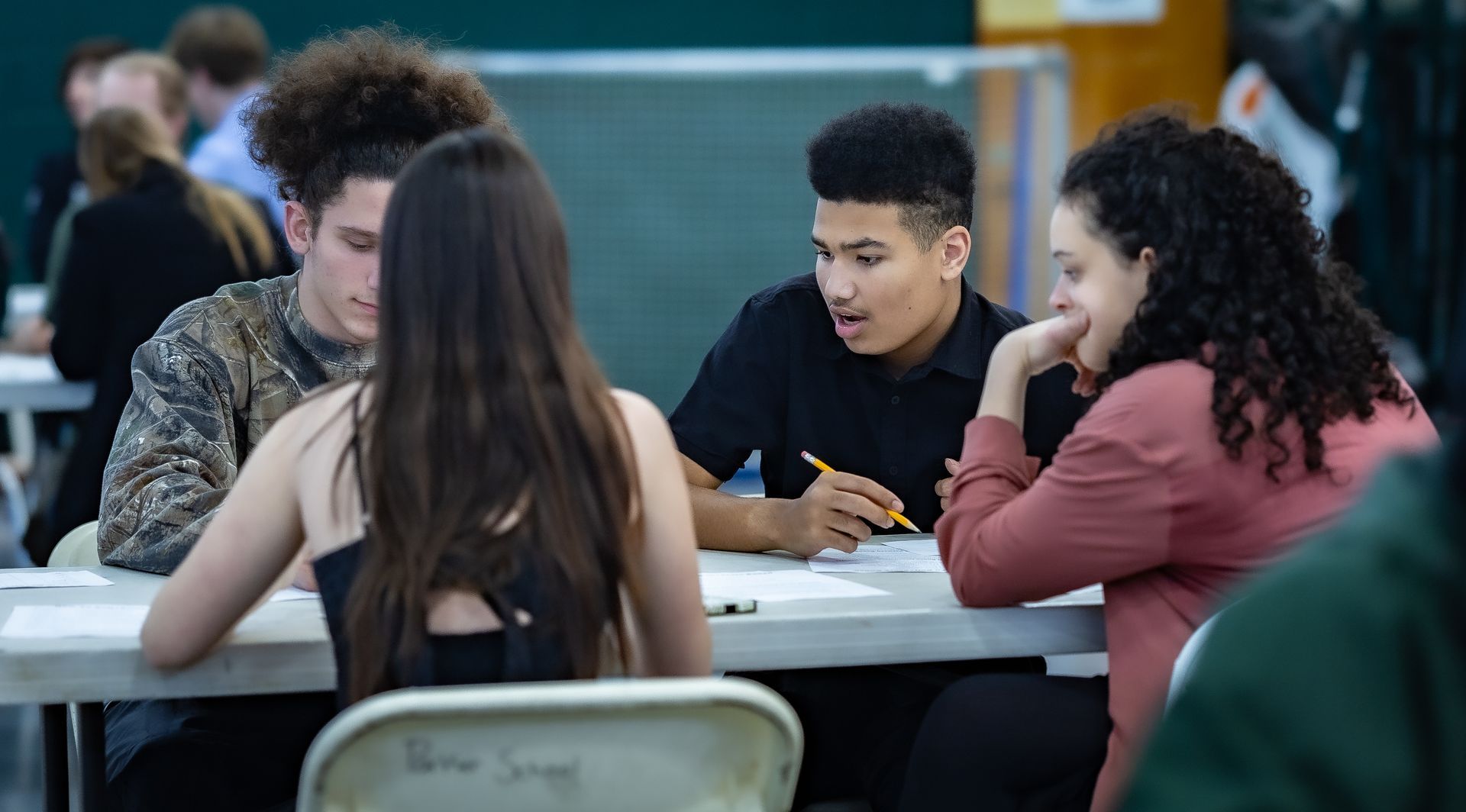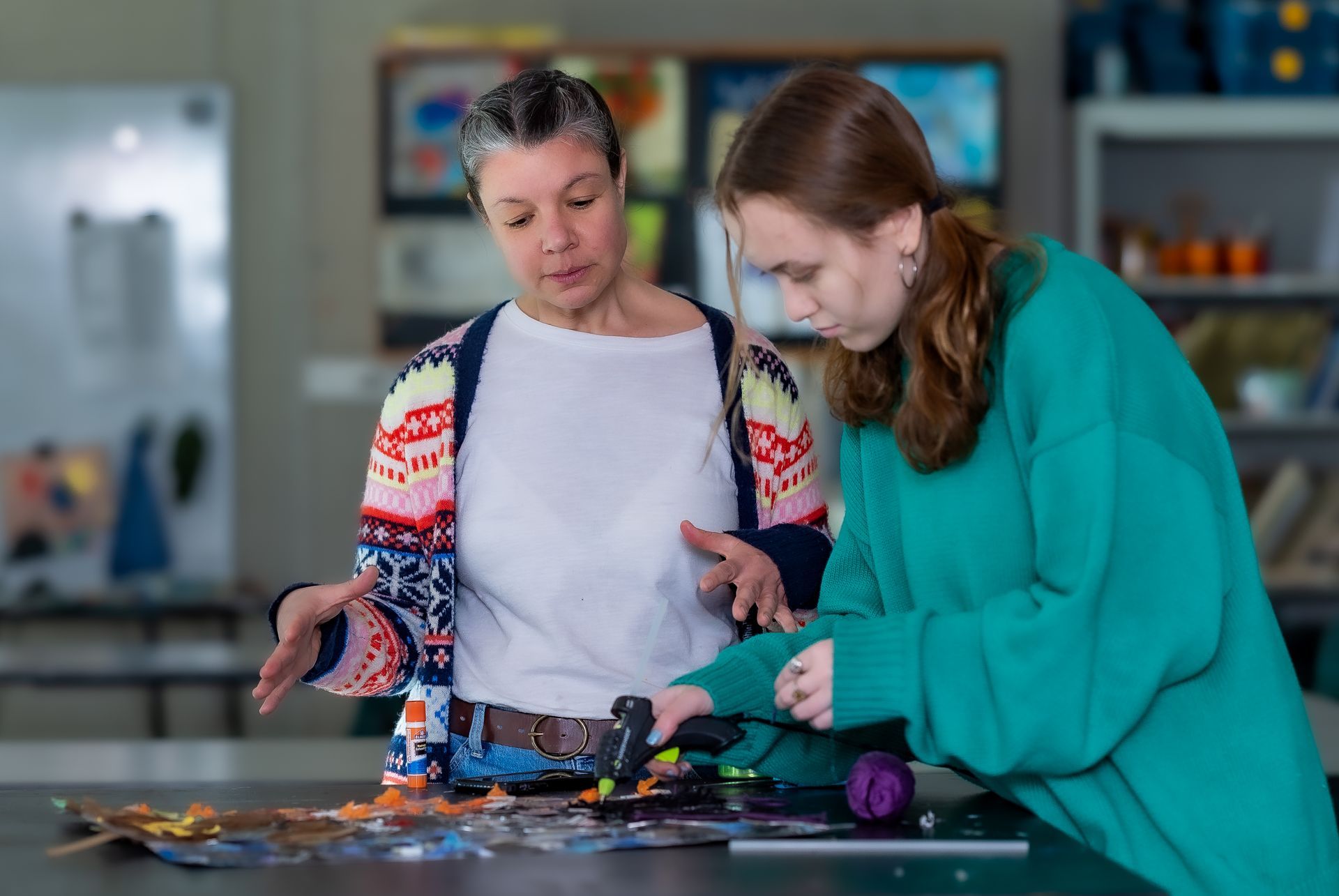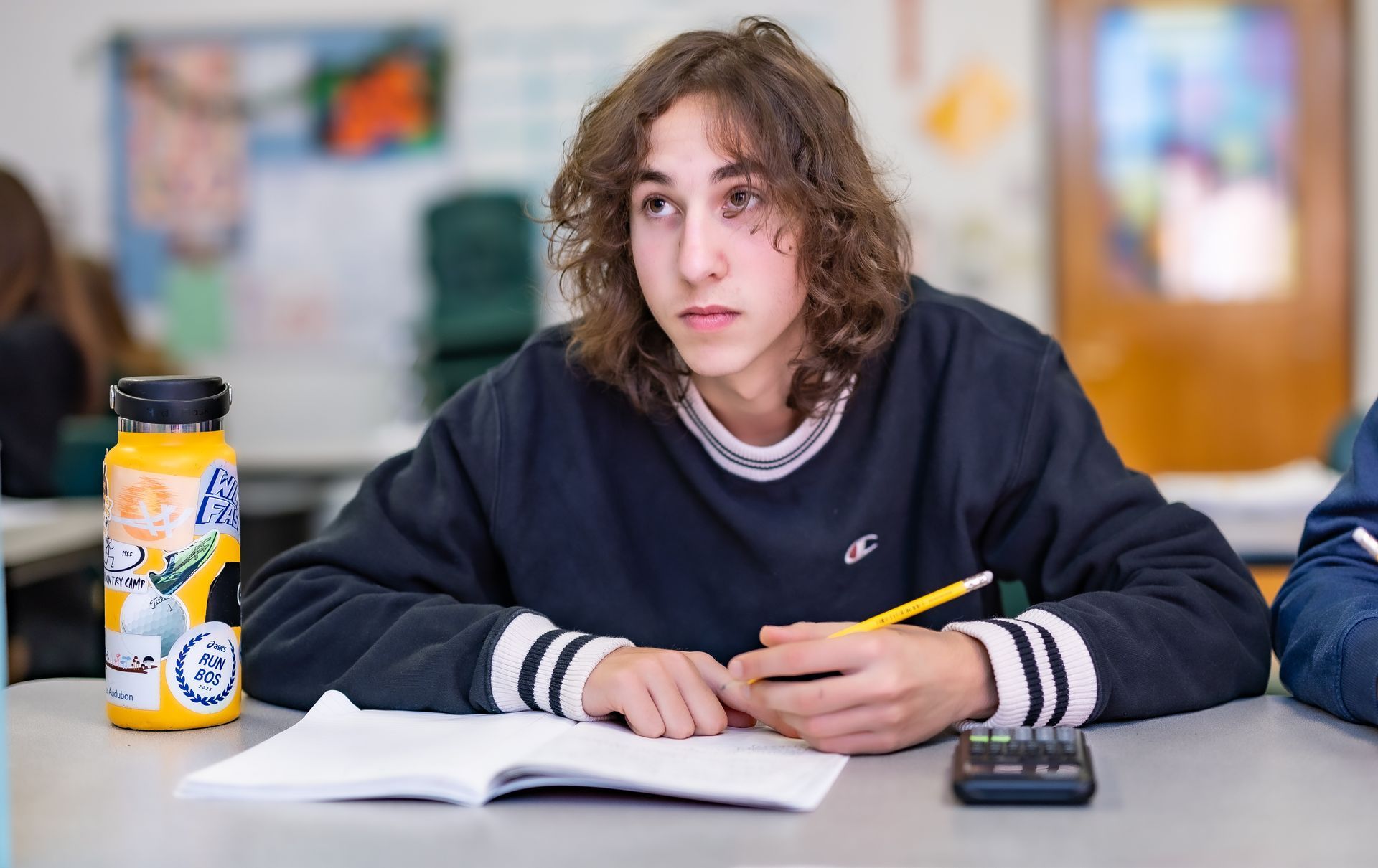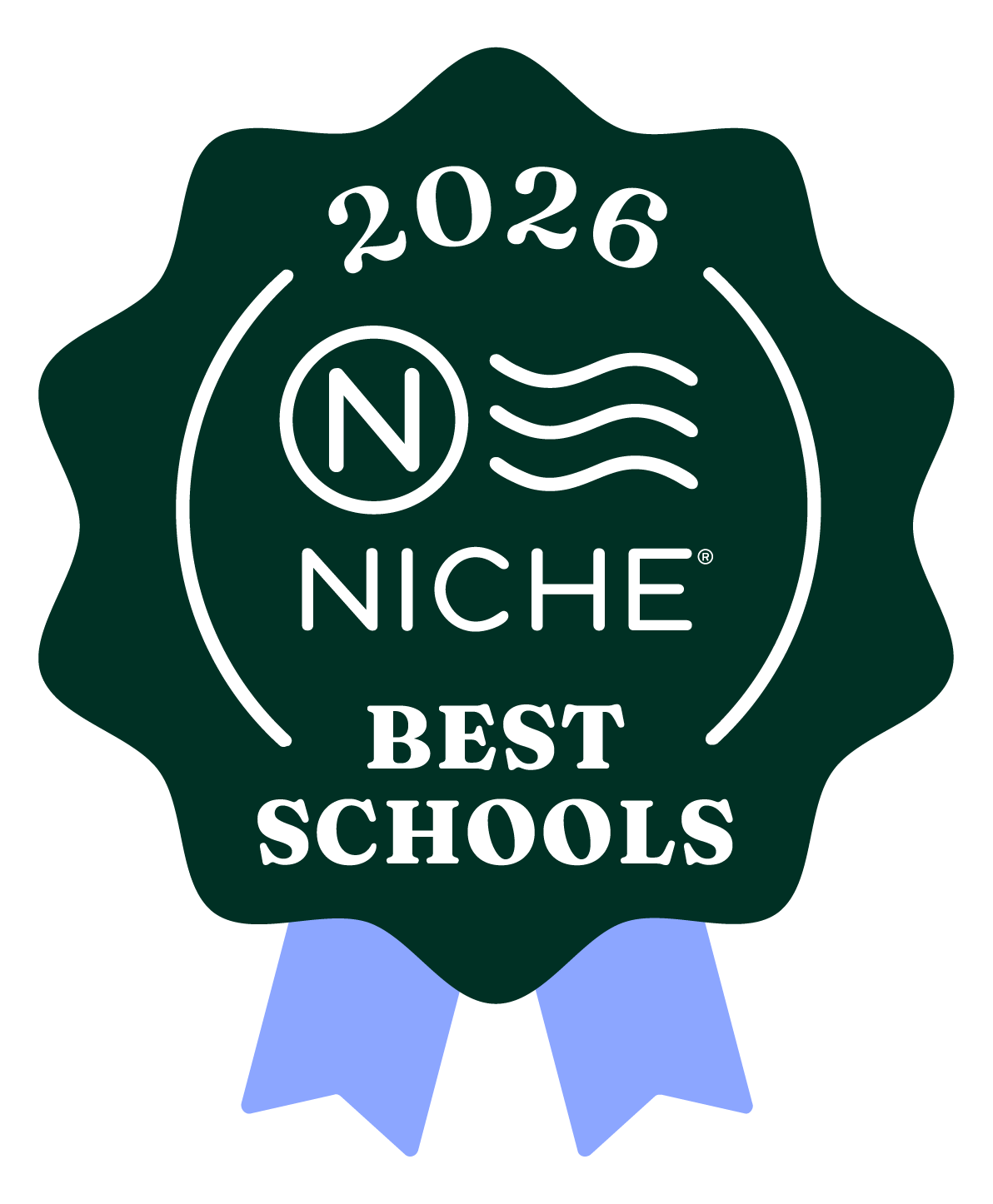A six year
Public School
- North Central Massachusetts
- Started in 1995
- 400 Students
- A Charter School
- An Essential School
About The Parker School
A six-year public secondary school of choice, the Francis W. Parker Charter Essential School is open by lottery admissions to all residents of Massachusetts in grades seven through twelve.
Parker is a progressive school which emphasizes learning to use one's mind well and putting the student at the center of the educational process. Students are known well at Parker. School climate is built on trust, decency, and democracy.
One of Massachusetts' first charter schools, Parker was started in 1995 by area parents and teachers committed to the principles of the Coalition of Essential Schools. Nationally recognized progressive educators Ted and Nancy Sizer were among Parker's founders and the school is part of their legacy; Ted and Nancy served as co-principals at Parker in 1998-1999.
The school was named after Francis W. Parker, the 19th-century New England educator who is known as the father of American progressive education.
What is an Essential School?
Established in 1984 by Theodore R. Sizer at Brown University, the Coalition of Essential Schools is a national network of over 1,200 schools and Centers engaged in restructuring and redesigning schools to promote better student learning and achievement. Essential schools share a common set of ideas known as the Ten Common Principles, which call for schools to set clear and simple goals about the intellectual skills and knowledge to be mastered by all the school's students; to lower teacher-student loads, personalize teaching and curriculum, and make student work the center of classroom activity; to award diplomas based on students' "exhibition" of their mastery of the school's program; to create an atmosphere of trust and respect for the school, faculty, students and parents; and to model democratic practices and honor diversity.
Explore
More about Parker
Program Summary
All curriculum development and teaching practices are guided by the Ten Common Principles of the Coalition of Essential Schools. Each year’s coursework revolves around a school-wide “Essential Question,” as well as on specific concepts and content in the academic disciplines, which reflect the Massachusetts Curriculum Frameworks.
Parker organizes instruction into integrated domains that include all the conventional subject areas:
- A/H – Arts and Humanities; includes History, Philosophy, Social Sciences, Literature, and Visual and Performing Arts
- MST – Mathematics, Science and Technology; includes Mathematics, all the Sciences, and Technology.
- Spanish – Spanish language and culture; instruction intended to enable students to communicate effectively and respectfully in Spanish-speaking cultures.
- Wellness – Health and Physical Education; integrated curriculum combining aspects of both traditional health classes with physical education, adventure programming, fitness skills and other mind-body connection skills.
Students are divided by division rather than grade level. There are three divisions at Parker:
- Div I – Roughly 7th and 8th grades
- Div II – Roughly 9th and 10th grades
- Div III – Roughly 11th and 12th grades
Div I and II are multi-year curricular cycles while Div III is comprised of semester and year-long Courses.
Class groups include a heterogeneous mix of 15 to 25 students whose ages span several years, and who work with one or two faculty members toward mastery of common standards. Every student is part of an Advisory group comprised of approximately 12 students and a faculty adviser.
Assessed based on these Essential Skills:
- Reading
- Writing
- Listening and Media Analysis
- Oral Presentation
- Research
- Artistic Expression
- Mathematical Problem-Solving
- Technical Communication
- Scientific Investigation
- Technology
- Systems Thinking
- Spanish Language
- Wellness
Assessments are based on the Parker scale:
- Beginning – Student is beginning to meet expectations for the division
- Approaches – Student is approaching expectations
- Meets – Student meets expectations
- Exceeds – Student exceeds expectations
The Parker School does not rank its students, nor does it award letter grades, honors or prizes. However, Parker students do take the required Massachusetts state assessments (MCAS) at grades 8 and 10 and the usual array of college entrance examinations such as the SAT and ACT.
Progress is exhibited via Portfolios:
Student work and progress is exhibited via Portfolios. Students can gateway from one division to the next based on Promotion by Portfolio and the successful completion of a Gateway Portfolio. Students gateway one domain at a time. It is entirely possible for students to be in different divisions for different domains.
Seniors prepare a Graduation Portfolio and meet additional Graduation requirements in order to be awarded a diploma from Parker.
An Introduction to Parker's Jargon:
Words and phrases which Parker people use as shorthand; perhaps mystifying to a newcomer:
- Advisory: a group of about 10-12 students that meets with an advisor (a Parker faculty member) daily for various amounts of time
- Authentic Assessment: judging student work for its applicability to the solution of real-world problems
- Chalk Talk: a group "discussion" carried out in silence, with participants writing their thoughts on whiteboard or a large piece of paper
- Coach: the teacher when he or she is working with individuals or small groups as they complete their projects
- Community Block: a period in which students and faculty work to benefit and/or provide service to the community (Parker and the wider world) and foster active and engaged citizenship among Parker community members
- Community Congress (CC): a legislative committee of students, each representing his/her advisory, or a percentage of the whole student body. There are also teacher representatives.
- Connections: structured time for sharing one's own news in a faculty meeting or an advisory in order to help participants focus and be ready to engage with the business of the class, meeting, or lesson
- Cooperative Learning: working on projects with others
- Critical Friends Group (CFGs): a group of faculty who are focused on improving their teaching practice to improve student achievement and advance whole school change
- Democratic Decision Making: governance by a wide group, supplemented by an even wider group of advisors
- Divisions: three sections of the school, each with certain requirements that each student must achieve in order to progress and ultimately graduate; divisions roughly equate to traditional grade levels, but students advance to the next level based on their ability to meet a given set of standards rather than their age
- Documentation: record of something that has been done
- Domain: Parker's four areas of knowledge: Arts and Humanities; Math, Science, and Technology; Spanish; and Wellness
- Dyad: a pair of teachers who handle one class or break it up as needed
- Essential Question: a broad question around which a large part of a year's work is organized; a question that helps to focus work across the domains; In 2004-05, the school's Essential Question is, "What is universal, what is unique?"
- Essential Schools: members of the Coalition of Essential Schools, a national school reform organization built around a short list of shared beliefs (The Ten Common Principles)
- Exhibition: a public presentation of student work, usually with an accompanying piece of written work; explanation and defense by a student of his or her work
- Experiential Education: projects and trips designed to help students learn from them
- Feedback: a response to an idea or a piece of work; comes in "warm," "cool" and other varieties
- Gateway: (n.): a series of exercises that a student traverses to progress to a new division. (v.): to advance to the next division
- Habits of Learning: qualities and characteristics identified as important to effective learning; the eight habits of learning at Parker are Inquiry, Expression, Critical Thinking, Collaboration, Organization, Attentiveness, Involvement and Reflection
- Individual Educational Plan (IEP): required by the state for students with diagnosed special educational needs, developed with Student Services staff
- Inquiry: organizing curriculum around questions and investigation
- Internships: periods of work that are designed around learning through experience
- Just Beginning/ Approaches/ Meets/ Exceeds: how a student's work is judged against the standards of her Division, indicating where she is in her progress towards a Gateway
- Justice Committee (JC): Similar to the CC in representation but different in purpose; they make decisions on student disciplinary issues and serve as the judicial branch of Parker governance
- "Less is More": the idea that one learns deeply by spending significant time on a relatively narrow subject, then applying its insights; shorthand for the second of the Ten Common Principles
- Massachusetts Comprehensive Assessment System (MCAS): a series of standardized, mandated tests administered to all public school students at various grade levels
- Personal Learning Plan (PLP): a student's individual academic and social goals for a certain period of time, worked out with his or her parents and advisor as a guide to his or her work
- Personalization: the assumption that each student will thrive best if taught in the way that are most effective for her or him
- Planning Backwards: deciding what an admirable graduate of Parker would "look like," then building into the six-year education the factors which will help each student to get there
- Portfolio: a collection of one's written, oral (audio and videotapes) and artistic work, available for assessment
- Process Folio: a work in process that forms a basis for a faculty round table discussion
- Protocol: a step-by-step tool for examining problems or dilemmas arising from teachers' and students' work
- Reflection: looking back on an experience to decide what it means, usually done in journals and in cover letters
- Rights and Responsibilities: guideposts for the student's moral growth, as assessed by himself and others
- Round Tables: small discussions, especially used by individual students and teachers presenting their work to their peers
- Rubrics: guides for students in determining how they have attained the expectations for work within a skill area
- Service Learning: work for others or for the environment that emphasizes the social and academic benefits for the worker as well as for those being helped
- Socratic Seminar: discussions based on commonly known texts that emphasize wide participation
- Standards: agreed-upon goals in various skill areas that are appropriate for all students; also refers to goals set for an individual student for a particular reason
- Standardization: the idea that each student is the same and will progress at the same rate
- Task Forces: small groups of faculty and students gathered for purposeful and specific work
- Tune: the habit of asking clarifying questions and giving warm and cool feedback when assessing another person's ideas or work
- Workshops: classes with intense instruction and practice of specific skills
- Whip: the practice of asking each member of a class or meeting to give a short response to a question
A six year
Public School
"Every student can reach the summit at Parker!" A few weeks before the pandemic began, the Massachusetts Charter Public School Association filmed this short video at Parker to showcase the school's incredible educational philosophy and program.
- Ten Common Principles
- Essential Question
- Four Domains
- Three Divisions
- Advisory
- Mastery of Skills
- Portfolios






